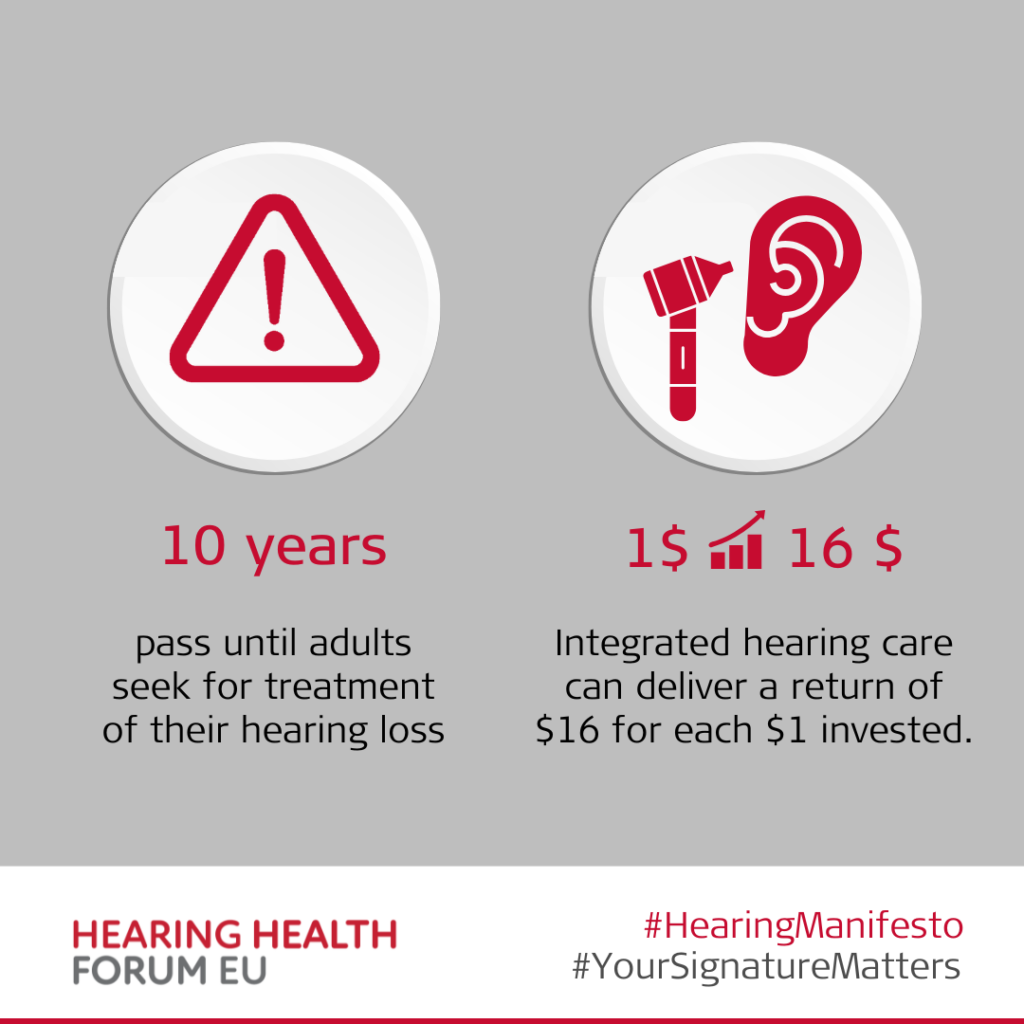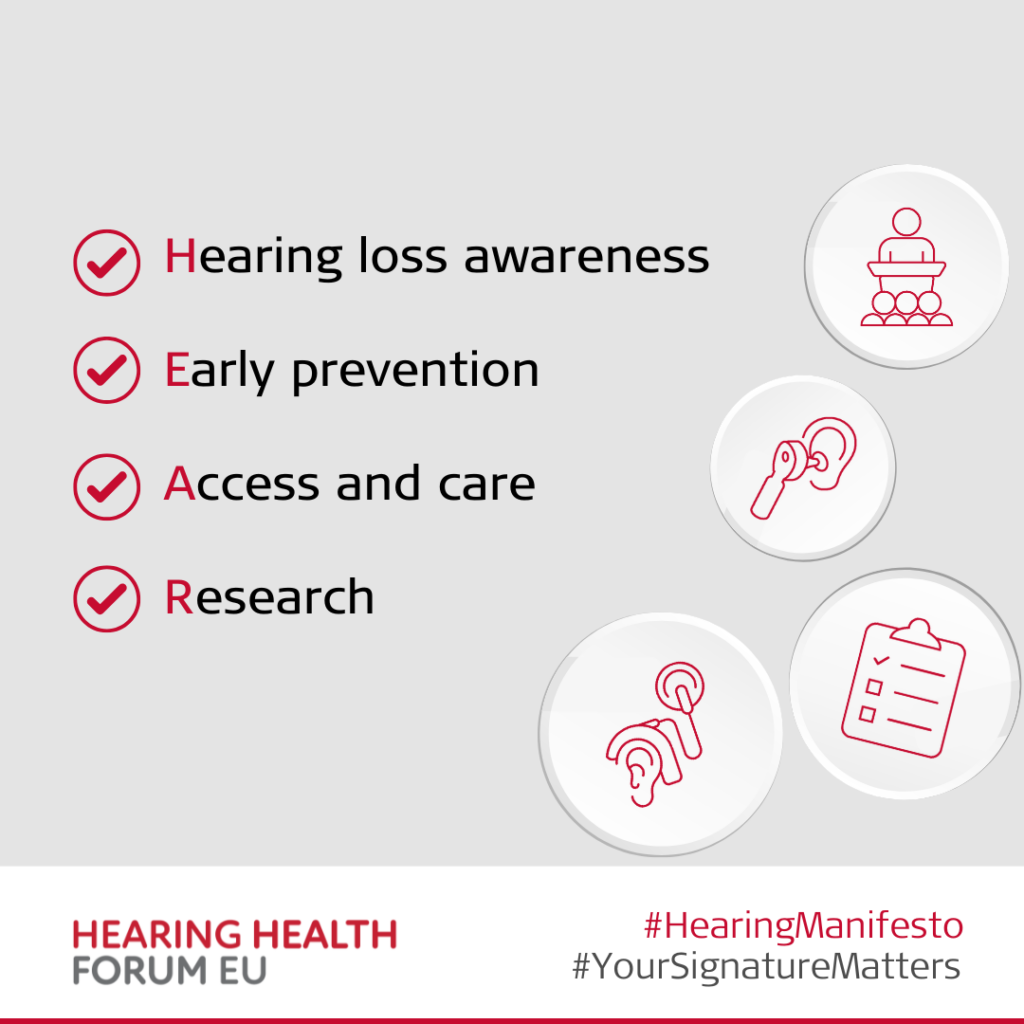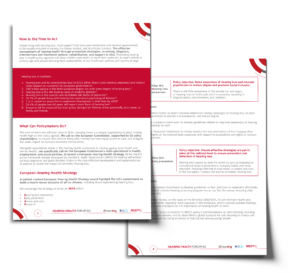The Hearing Health Forum EU believes that implementing hearing screening and care programmes for all ages is one of the most effective ways of improving the world’s hearing health. For a healthy Europe, we want to bring hearing health higher on the political agenda.
Importance of Hearing Care
Hearing screening is the first and basic step towards enhanced hearing health. While effective treatments such as hearing aids, cochlear implants, and bone conduction systems exist, a significant gap exists in their accessibility. Research reveals that, on average, adults wait up to ten years before seeking treatment for their hearing loss[1], and that only 17% of people who could benefit from a hearing aid actually use one[2]. This figure decreases to just 4.2% when considering the use of cochlear implants[3]. This is not due to a lack of available treatments but rather the absence of robust healthcare systems that ensure equal access to lifelong hearing care.
To address this disparity, systematic hearing tests across populations emerge as a solution, breaking down barriers, identifying those with untreated hearing loss, and averting long-term repercussions when follow-up treatment and care is provided. According to the WHO, Increased access to integrated hearing care can deliver a return of $16 for each $1 invested [2].

Calling for a European Hearing Health Strategy
Beyond the implementation of hearing screening programmes, we call on the European Commission, supported by EU policy stakeholders, to launch a European Hearing Health Strategy. This will help to ensure that people living with hearing loss have equal access to care, and mitigate the wider impact on Europe's economy and societies.
A patient-centred European Hearing Health Strategy would highlight the EU’s commitment to build a Health Union inclusive of all its citizens, including those experiencing hearing loss.
We encourage the Strategy to focus on HEAR pillars:
- Hearing loss awareness
- Early prevention
- Access and care
- Research
By following this approach, we can ensure that the EU leads by example by launching a European Hearing Health Strategy that promotes a cross-sectoral, collaborative approach to tackling healthcare inequalities and limited access to quality of hearing care services and across a person’s lifetime.

Policy Landscape
Multiple policy papers exist that address hearing loss and its implications. The European Commission’s Healthier Together - EU Non-Communicable Disease Initiative calls for the implementation of newborn hearing screening programmes for early detection and treatment. Recognizing hearing impairment as a modifiable risk factor for dementia underscores its significance, particularly since preventing and detecting dementia early is one of the Initiative’s key priorities.
In alignment with this, the European Union's Green Paper on Ageing emphasizes the importance of fostering long, healthy, and independent lives to extend individuals' work careers through participation in voluntary activities. The benefits of voluntary work, as highlighted by the EU, extend beyond societal gains to encompass economic advantages. Also, the European Commission's adoption of the Strategy for the Rights of Persons with Disabilities 2021-2030 shows that access to the labour market remains one of the main challenges for people with hearing loss. The United Nation’s Convention on the Rights of Persons with Disabilities emphasizes that States shall ensure inclusive education for persons with disabilities, specifically highlighting children who are hard of hearing.
The WHO's World Report on Hearing stresses the need for accessible hearing technology and rehabilitation services, emphasising a person-centered approach. Meanwhile, the United Nations' Action Plan for a Decade of Healthy Ageing acknowledges the demand for long-term integrated care for older individuals and advocates for a shift in societal perceptions and attitudes towards age and ageing.
The WHO’s World Report on Hearing coupled with all the mentioned policy recommendations makes clear that now is the time to act to offer hearing care and treatments for all citizens experiencing hearing loss: by investing in their future, their quality of life will be improved, as well as their productivity at work and overall contribution to the EU’s economy.
Taking Action: Our Recommendations
At the HHFEU, we support the WHO’s call to provide a “whole life” approach to hearing health care. That means introducing hearing screening throughout the lifetime of an individual, with a particular focus on newborn babies and older adults. By identifying hearing loss at these key points, we can raise the hearing health of societies, and give individuals the quality of life they deserve.
This is in line with our EU Policy Recommendations, which call for policymakers to:
- Raise awareness of the importance of hearing health, the impact of hearing loss and the benefits of hearing loss treatment among the public and healthcare professionals.
- Promote the need for robust national hearing health strategies including diagnosis, rehabilitation, service and maintenance.
- Introduce a national Newborn Hearing Screening Programme and Over 55 Hearing Screening Programme.
- Acknowledge access to professional hearing care as a right.
- Promote access to effective treatments including hearing aids, bone conduction devices, and cochlear implants.
- Explore and invest in effective methods of prevention and rehabilitation for hearing loss.
- Share best practices among EU Member States.
References:
- (1) Simpson, A.N., et al., Time From Hearing Aid Candidacy to Hearing Aid Adoption: A Longitudinal Cohort Study. Ear Hear, 2019. 40(3): p. 468-476.
- (2) World Health Organization, World Report on Hearing. 2021: Geneva.
- (3) Saunders, J.E., H.W. Francis, and P.H. Skarzynski, Measuring Success: Cost-Effectiveness and Expanding Access to Cochlear Implantation. Otol Neurotol, 2016.
- (4) Santos-Cortez, R. and C. Chiong, Cost-analysis of universal newborn hearing screening in the Philippines. Acta Medica Philippina, 2013. 47: p. 53-57.
- (5) Organization, W.H., Global costs of unaddressed hearing loss and cost-effectiveness of interventions. A WHO Report, 2017.

